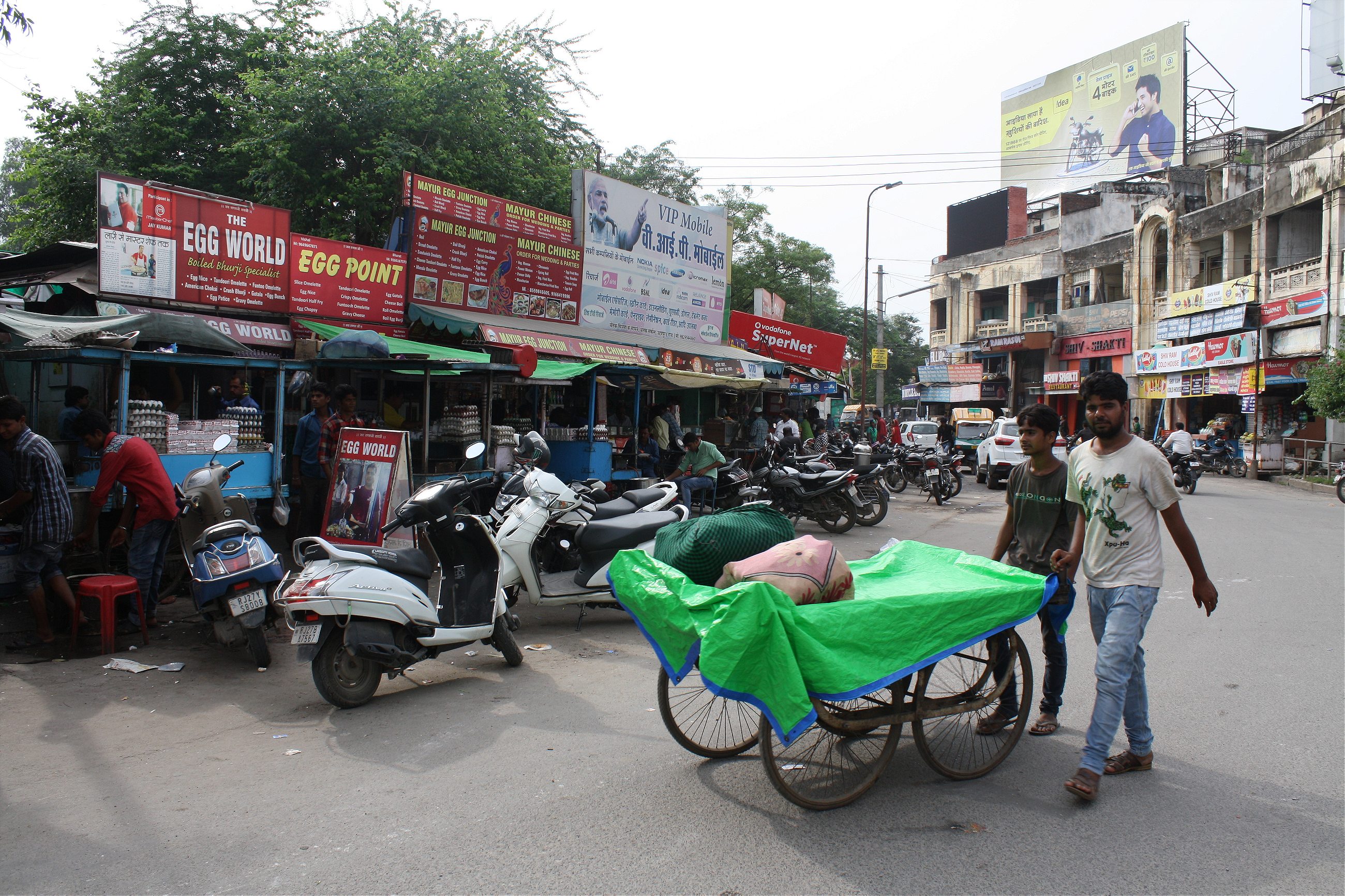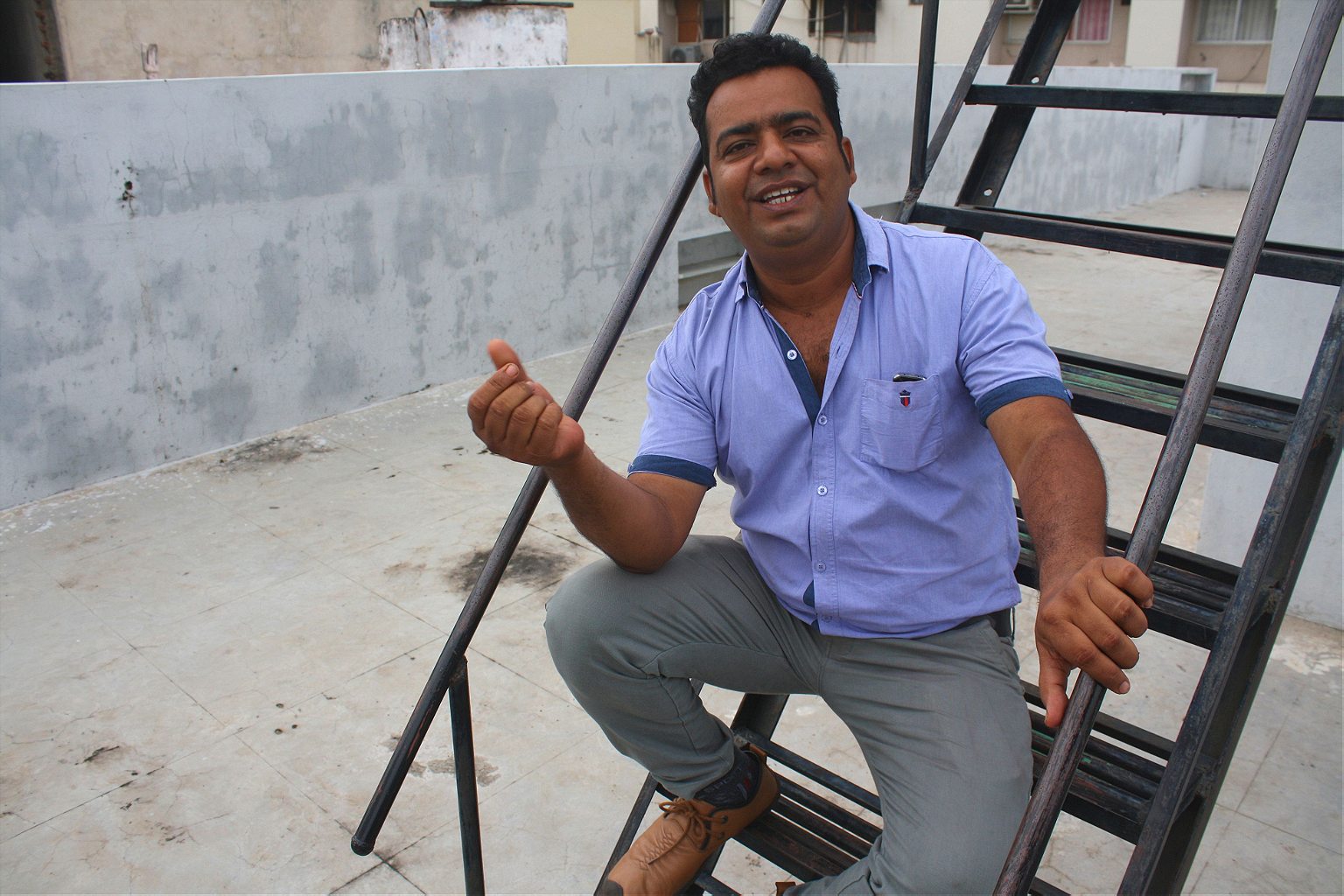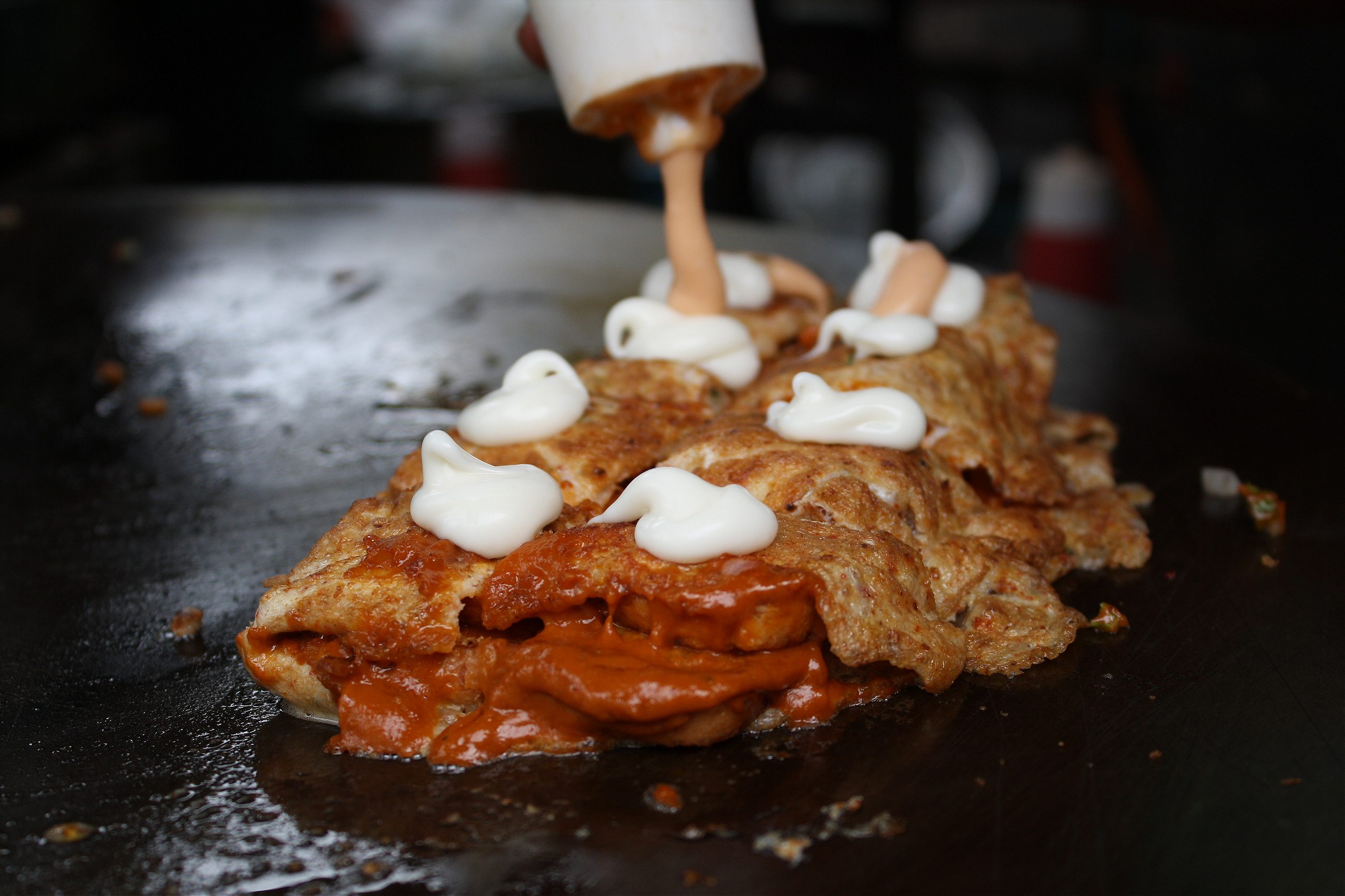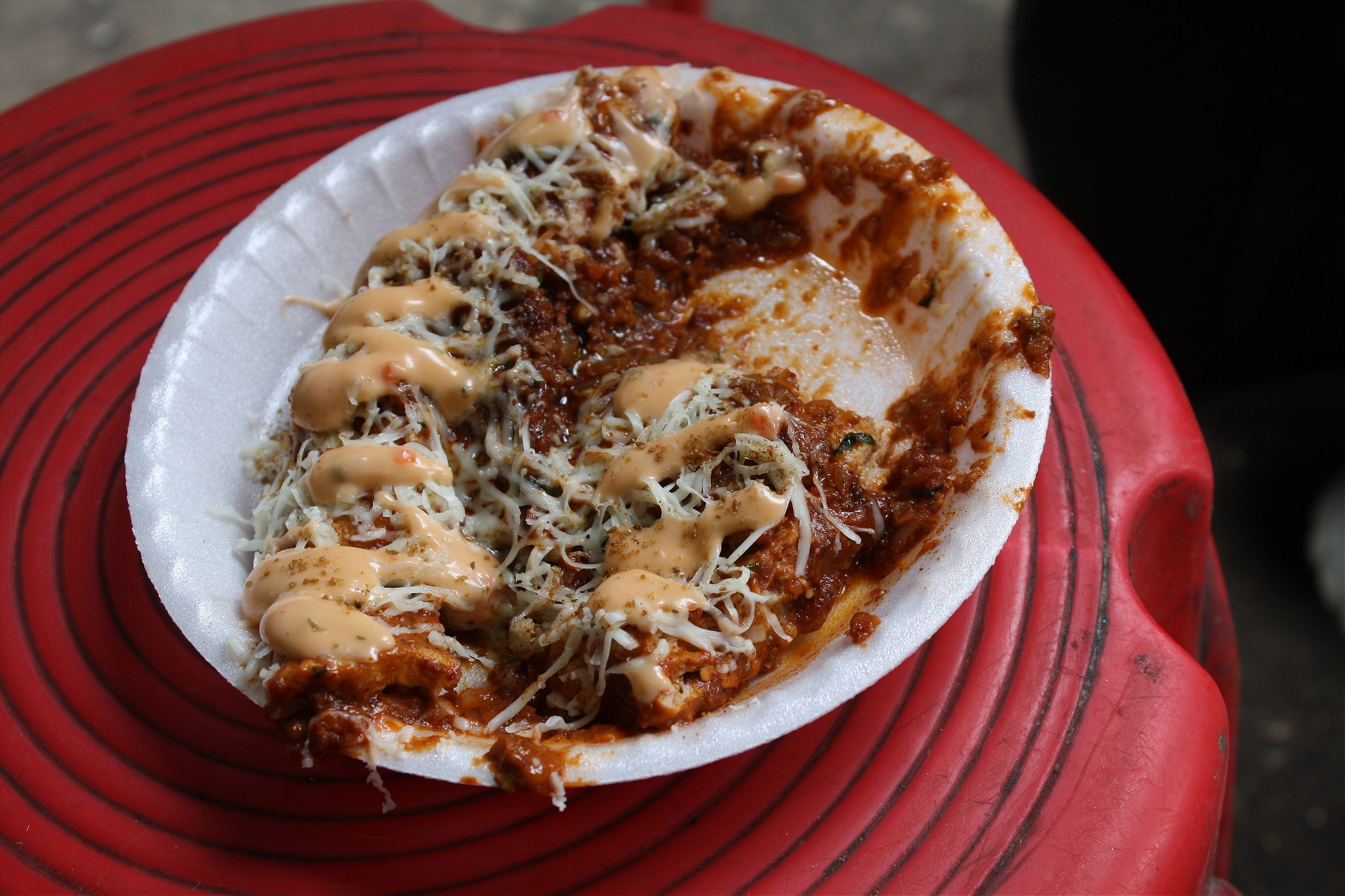How one man turned a grimy food stall into a culinary juggernaut with hard work, determination, and eggs. Lots of eggs.
Udaipur is known as a place of dreams, at least if you are a bride from a rich Indian family. The city of lakes, located in India’s northwestern state of Rajasthan, consistently ranks as a top wedding destination. Life within the city’s seven-star palatial hotels seems a world away from the chaos that most expect of India. Tranquil, extravagant, and picturesque, some refer to it as the “Venice of the East.”
But the city stretches beyond its tranquil lakes and 1,000-dollar-a-night hotels. And despite what the locals believe, it is much like other Indian cities, displaying the flaws of India’s rapid urbanization. The city center is a cacophonous mess; every driver seems to have a death wish and every inch of available space is taken up by shops.
It is in this part of the city that I stumbled upon a spot whose culinary creations stood out even in a country known for its rich food culture. It was not an upscale restaurant, nor was it run by a celebrated chef. This was a humble food stall tucked in a corner of a nondescript street. And the man behind this greasy laboratory was Jay Kumar Valecha.

Valecha has been whipping up egg dishes for close to 25 years, all from the same stall, aptly called The Egg World. About a year after I first met him, I braved a 16-hour train ride from my home in Mumbai back to the city, to try The Egg World’s delights and to try to understand Valecha’s unlikely egg-based success.
I was only one of the hundreds of people who queued up for the famous boiled egg bhurji on the eve of India’s 70th Independence Day. Others waited for the thick and spicy tandoori omelette. Those are just two of the 20-odd egg dishes served at The Egg World, each of which Valecha names himself: egg bunch, egg nice, fantoo omelette, gravy omelette, egg chopsuey, egg patty. Each one is pan-fried either in oil or butter, often smeared with mayonnaise, and served with a generous helping of grated cheese. Health food, it is not.

“I make more money than I need,” Valecha claims. Always smiling, he is his own best brand ambassador.
We are chatting over cups of milky, sweet tea on the terrace of a guest house near his stall. For a man with hardly any formal education who sells egg dishes at less than a dollar each, Valecha is indeed doing quite well. During my trip, I visit a plush clothing store that Valecha purchased for his eldest son, Yash, to run. He has also bought a plot of land on which he plans to build a home that will house his sons, his brother’s family, and his staff. And if imitation is the highest form of flattery, the presence of two blatant copycats nearby—Egg Point and Mayur Egg Junction—is praise indeed.
But things haven’t always been easy for the 43-year-old. His smile and quick wit mask his past struggles. What is now The Egg World used to be a nameless stall run by his father. It served omelettes and boiled eggs to a handful of customers. Most of the largely male clientele would come with cheap bottles of whisky and rum, known in India as quarters. The eggs were just something that made the intoxicants bearable.
While he was in his teens, Valecha’s father’s health deteriorated. As the eldest of three sons, Valecha took responsibility for the family, as is expected in most Indian households. At 17, he had to deal with the physical toll of his work and his family’s financial uncertainty.
“Jay has struggled a lot since he was a kid. But somehow, he has this uncanny ability to smile through everything,” says Harish Chawla who runs a mobile phone store close to The Egg World. A friend of Valecha’s father, Chawla was his mentor during difficult times.

The family was renting an apartment at the time, and after failing to pay rent for three months, the owner locked them out. Valecha had to borrow 300 rupees (about seven dollars) from a friend of his father’s so that they could get back into their home. After that, Valecha promised to free himself from the shackles of poverty. After experimenting with a couple of odd jobs, he decided the way out was his father’s egg stall.
Valecha decided he needed to serve something memorable to lure in new customers and keep them coming back. He began to experiment with what became boiled egg bhurji, a take on the Indian version of scrambled eggs. He sautéed chunks of boiled eggs instead of breaking them right into the pan, then got a local manufacturer to make sugarless ketchup that he added to the traditional mix of onion, tomatoes, eggs, and spices. From that moment on, his customer base started growing.
The tandoori omelette soon followed. A thick omelette studded with slices of bread and topped with mayonnaise, a spicy sauce, and ketchup, it is a favorite among younger customers. “The customer is my guide and my laboratory,” Valecha says. “I come up with new dishes on the spot and ask customers to try them. If they like it, I introduce them in them menu.” Slowly, word spread about this interesting egg stall that sat across from a cinema. From a seedy corner, The Egg World turned into a must-stop for foodies from across the city. That Valecha is also charming helped keep customers coming back.

Over the last decade, The Egg World has had remarkable success. In addition to the long lines that have become standard, Valecha auditioned for the Indian version of the TV show Master Chef, and, after impressing the judges, was selected for round two in New Delhi. He didn’t make the cut for the next round, but he remains confident.
“Someday, I will show the world that I am the king of eggs,” he tells me as I dig into one of his latest creations, the gravy omelette. For this dish, Valecha combines a rolled-up onion omelette with a thick and spicy curry. It isn’t the most popular thing on the menu, but Valecha says many of his customers swear by it.
Despite it’s small size—about 80 square feet—The Egg World now boasts a team of 12 people who churn out egg dishes using three griddles. Every day they break 1,500-2,000 eggs, chop 90-100 pounds each of onions and and tomatoes, and dice about 10 pounds of green chillies and coriander leaves. These numbers would be staggering for a restaurant; for a tiny stall with hardly any seating, it is astounding.
Establishments that serve non-vegetarian food and alcohol get seedy reputations
The staff is now a formidable team. Valecha’s brother, son, and two nephews are all now egg artists in their own right. Chandu, one of the other employees, is responsible for all the chopping and cutting. He has been doing the same thing for six hours every day for the past six years. Later in the evening, he joins the rest of the team next to the griddle to dice boiled eggs using sewing thread.
With a sizeable staff and continued financial success, I wondered why The Egg World hasn’t morphed into a proper restaurant. Mention of a restaurant elicits a rare crack in Valecha’s relentlessly confident persona. He has long worried that a restaurant would fail, pulling him back into the poverty he fought so hard to escape. At a fraction of the operating cost, The Egg World stall felt safe. But as his customer base changes, he is reevaluating the idea.
Many of the stall’s customers are now women. In Rajasthan, as in many parts of India, eating non-vegetarian fare (egg is not considered vegetarian by Hindus) in the company of men is still taboo for many women. The types of establishments that serve non-vegetarian food and alcohol often garner seedy reputations.
But eating the same food in a well-lit, air-conditioned restaurant is considered acceptable by many people. This has convinced Valecha that a brick-and-mortar restaurant will bring in new customers and allow him to charge a premium. He is currently scouting for a restaurant location; once opened, he will entrust the new venture to his son and nephews. For his part, he will continue to work on his favorite iron griddle across from the cinema.

The skeptic in me wondered whether 15-20 egg dishes would be enough to anchor a restaurant.
“Yeh toh sirf jhaaki hai, Mathura-Kaashi toh abhi baaki hai,” Valecha says, a Hindi proverb meaning that these offerings are just a peek of what’s to come. He intends to launch the restaurant with 51 egg dishes, more than half of which will be new creations. It did seem like he had it all planned.
I decided to bid goodbye with my favorite dish, the egg bunch, a mixture of boiled egg bhurji and regular Indian scrambled eggs that is then wrapped in yet another layer of fried egg. Digging into this burst of flavors, I believed that someday The Egg World could truly be a restaurant chain. Maybe Valecha or his sons and nephews will even take it international; it’s not impossible.
But if that happens it will be good to remember that this empire rose from a grimy roadside stall in Udaipur, built with one man’s grit, innovation, and optimism. And with eggs; tons and tons of eggs.